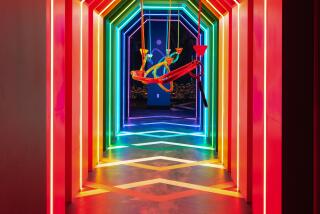Created as satire, ‘Avenue 5’s’ commentary hits uncomfortably close to home
“Avenue 5” launched as a cheeky sci-fi spoof, but by the end of its nine-episode orbit in mid-March it had inadvertently become a searing indictment of this fraught historical moment. The latest riotous satire from “Veep” creator Armando Iannucci nails something true and deeply worrying about human beings, especially when placed under pressure — a scenario playing out in real time with the onset of COVID-19 — namely, that we are largely ill-equipped to help each other through a crisis.
After a luxury space cruise ship is knocked off course, years are suddenly added to the weeks-long getaway the wealthy passengers thought they had signed up for. When they then discover that the charming, resolute and handsome American captain, played by Hugh Laurie, is actually just an actor (and a balding, British one at that), the fragile social structure quickly breaks down. As with all of Iannucci’s comedic work (“The Death of Stalin,” “The Thick of It”), the sophisticated and the puerile mix to illuminating, entertaining effect.
“I like comedy that has ideas and ridiculousness at the same time,” says Iannucci, whose influences include “Airplane!” and Buster Keaton as well as Monty Python and “The Hitchhiker’s Guide to the Galaxy.” The Emmy-winning, 56-year-old Scotsman knew after he left “Veep” that he was interested in exploring groupthink and the idea of “events being controlled by feelings and emotions.” Placing a cluster of humans in isolation under extreme stress would lend itself to this.

Trailer for Season 1 of “Avenue 5” on HBO.
“Avenue 5’s” vicious satire takes aim at many of our culture’s blind spots — an obsession with attractiveness at the expense of expertise, the hollowness of corporate culture, the worshipful conflation of wealth and brilliance — but the show is particularly intrigued by the question of leadership.
Or as Iannucci puts it, “People who say they’re in charge actually making it up as they go along and assuming that someone else is in charge, and then realizing that no one’s in charge. Anything that smacks of authority, the more you examine it the more you realize how vulnerable it is.”
If this sounds pointed, that’s by design. Yes, the show’s title is a reference to President Trump’s claim that shooting someone “in the middle of Fifth Avenue” wouldn’t cost him any voters, while the overwhelmed Capt. Clark and fatuous billionaire Herman Judd (played by Josh Gad) are complementary avatars of the administration’s abysmal lack of expertise, organization and focus. But as with “Veep,” the news has mimicked the show’s story lines in discomfiting ways, turning “Avenue 5” into a commentary on COVID-19 and society’s split reaction to it.
For starters, the very premise of passengers stranded on a luxury cruise ship was perfectly mirrored here on Earth at the time of the HBO show’s Jan. 19 debut (by early May, more than 100,000 actual crew around the world were still trapped on cruise ships). Episode 6, which aired Feb. 23, involves passengers and crew being forced to ration oxygen (toilet paper?) and the White House suggesting the ejection into deep space of “500 non-essential passengers.”
Then, in mid-April, a friend sent Iannucci a shot captured by Columbia Dispatch photojournalist Joshua Bickel of bellowing American protesters pressed against the glass of the Ohio governor’s office demanding an end to the state lockdown. “The expressions on their faces!” Iannucci says. “It looked so much like the passengers trying to go out the airlock.”
With series like “Stranger Things,” “Avenue 5” and “What We Do in the Shadows,” monsters, space and vampires are now good for a giggle.
As anyone who watched the gaspingly funny and disturbing climax of Episode 8 can tell you, the brutal airlock scene — in which many passengers decided they were being lied to and hadn’t left Earth at all — is the apotheosis of what the show captures about our national psychosis. It illustrates, horrifyingly as people eject themselves out into the void, how the delusional certainty of those who write off events as “fake news” and an accumulation of lies from purported authority figures can collude to produce poisonous consequences. But, you know, in a really amusing way.
By the time the pandemic hit, Iannucci and his writing staff had already mapped out Season 2, and they’re using the delay in production to write all the teleplays so they can jump back into production as soon as circumstances permit. Iannucci hints that the next season will widen its scope to introduce some new characters and show more of how the ship’s tragedy has been playing out down on Earth.
Still, the eerie prescience of his imagination has Iannucci joking about a change in creative direction — before he kills us all. “I’m going to write something about how lots of really good people are elected and sort everything out in the space of two to three months,” he muses. After pausing to reflect on the idea, he notes, “It’s not terribly funny.”
Five seasoned entertainment journalists predict the shows and performances the Television Academy will honor with Emmys; do you agree with their picks?
More to Read
The complete guide to home viewing
Get Screen Gab for everything about the TV shows and streaming movies everyone’s talking about.
You may occasionally receive promotional content from the Los Angeles Times.






